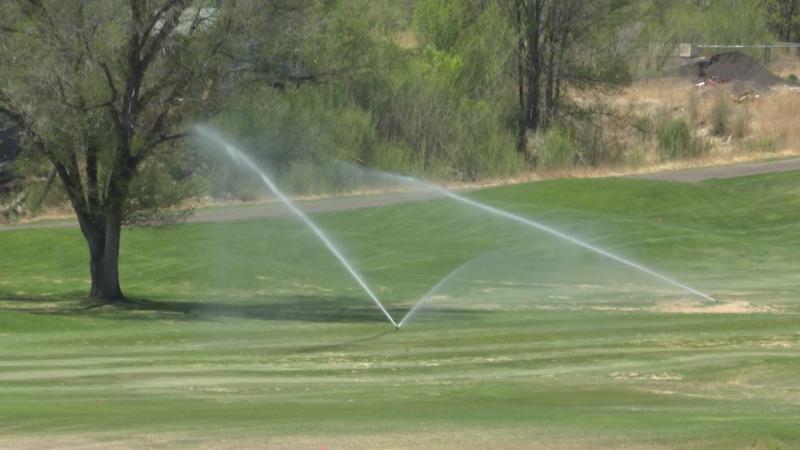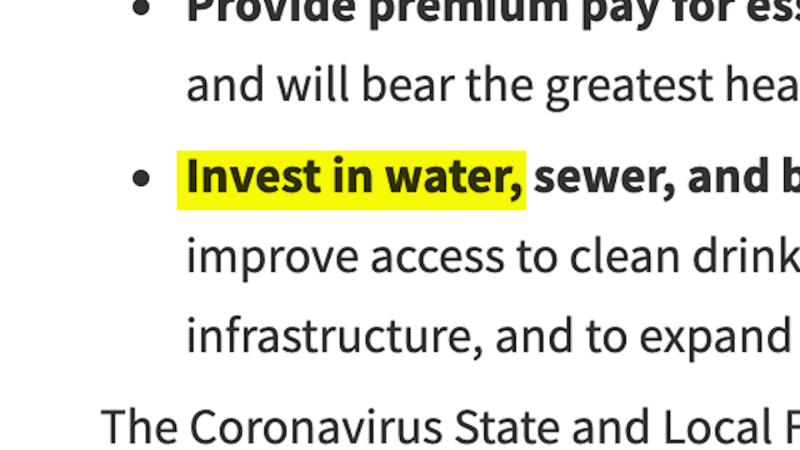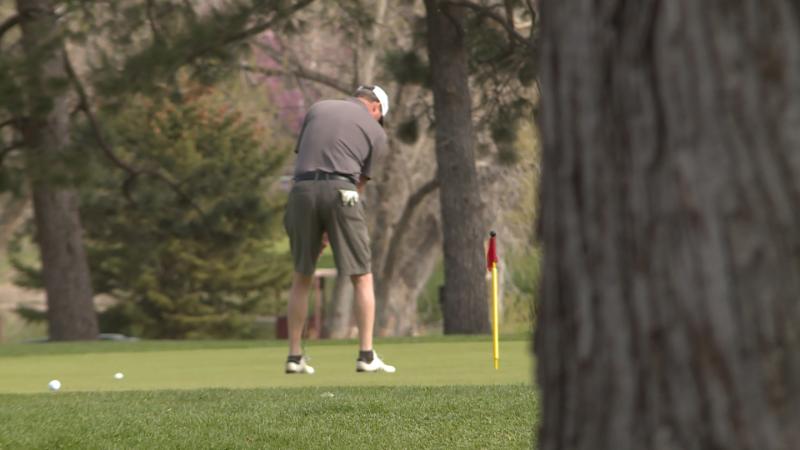13 Investigates: Colorado Springs golf courses receive millions from federal COVID recovery fund

COLORADO SPRINGS, Colo. (KRDO) -- Federal money meant to help communities across the country recover from the pandemic is being used by Colorado Springs elected leaders to benefit the ultimate leisure sport - golf.
The City of Colorado Springs is planning to spend millions of federal dollars meant for COVID-19 recovery on the city's two publicly owned golf courses, Patty Jewett Golf Course and Valley Hi Golf Course.
Some elected officials tell 13 Investigates this is a responsible financial decision for the city, but others feel that these funds ought to go to more applicable needs.
In March 2021, the United States Congress passed the $1.9 Trillion American Rescue Plan Act (ARPA). Within the bill is a $350 billion fund called the Coronavirus State and Local Fiscal Recovery Funds. The fund is meant to deliver billions directly to local governments across the country to "support their response to and recovery from the COVID-19 public health emergency."
Broken down:
- The City of Colorado Springs received $76 million
- The city of Pueblo took in around $36 million
- El Paso County nearly received $140 million
The City of Colorado Springs intends to purchase new irrigation systems to support water conservation efforts at both city-owned golf courses. The municipal golf enterprise, funded entirely by user fees from golfers, spends on average around $700,000 on the water at both golf courses each year according to the golf courses manager.
“The irrigation systems at both golf courses are about 37 years old," Patrick Gentile told 13 Investigates.
Gentile manages the layout of all 45 holes at both city-owned golf courses. He says the old infrastructure is hard to miss when golfers approach the tee.

“There are playability issue at times," Gentile said. "It’s an aesthetic issue but we aren’t utilizing our water correctly."
Gentile, the Golf Division Manager for both courses, says a new irrigation system isn't just a new sprinkler system. He says a new irrigation system brings a modernized approach to utilizing grass space and being more efficient with water.
"Unlike your home system where you turn on one valve, and six heads pop up along your yard. With these new systems, you are allowed to turn on one head let that area water for a little bit and then shut it down,” Gentile said.
The City of Colorado is also spending $10 million from ARPA on assisting businesses to recover from the pandemic, $5 million on a new dispatch system for Colorado Springs Police Department, $250,000 on vaccine support, and many more projects.
However, the use of $6.6 million from the "Coronavirus State and Local Fiscal Recovery Fund" for golf courses is prompting one elected official to raise questions.
"So we irrigate better, fine. There are better ways to spend money than the sprinkler system," Colorado Springs council member Bill Murray said.
Murray, along with his fellow Colorado Springs council members, approved the city's plan to spend the ARPA funds last year. Still, Murray feels the money should go to more pressing issues.
“911," Murray said when asked what projects he would prefer to receive the federal funds.
"There are always police requirements, new police cars, that type of thing. In addition, the ARPA funds were supposed to help us with COVID-related issues,” said Murray.
The criteria for the Coronavirus State and Local Fiscal Recovery Funds say funds can be utilized to "respond to the far-reaching public health and negative economic impacts of the pandemic, by supporting the health of communities, and helping households, small businesses, impacted industries, nonprofits, and the public sector recover from economic impacts."
However, the U.S. Department of the Treasury's criteria also states that local governments use the federal funds for investments in water.

In a statement to 13 Investigates, the City's Chief Financial Officer Charae McDaniel said the new irrigation systems will save the city water, and help make progress on water conservation goals.
"A portion of the American Rescue Plan Act (ARPA) funds received by the City of Colorado Springs have been allocated to water quality and conservation, which includes infrastructure projects to replace aging, inadequate, and outdated irrigation systems managed by the City. Water conservation is an eligible expense under the guidelines for this federal funding, and the irrigation systems at Patty Jewett and Valley Hi municipal golf courses are among the projects selected for funding in this area. These systems are more than 30 years old and the technology is dated, inefficient and not making use of modern technology and water saving techniques. Implementing modernized irrigation will achieve water savings, help protect our community’s water resources, and make progress toward state and regional water conservation goals.
When the City was determining how to allocate its ARPA funding, we looked at eligible items that were not only unfunded, but also have difficulty finding an alternate eligible funding source. The golf courses have been trying to finance new irrigation systems for the last several years, but because of how City enterprises are structured, it is very difficult for them to make large capital investments, even toward something as important as water conservation. Water conservation is a priority of the City, and we are diligently working to update irrigation systems across City properties. Achieving water savings at the golf courses benefits the broader picture of water conservation citywide."
Charae McDaniel Colorado Springs Chief Financial Officer
“I think it’s a good move,” Colorado Springs council member Yolanda Avila told 13 Investigates. Avila lives just minutes away from Valley Hi Golf Course. Unlike her fellow council member Murray, she feels the irrigation systems for the two city-owned golf courses are the ideal use of the federal funds.
“It’s a one-time expense and we wouldn’t be able to fund the project through our general fund," Avila said. "With the virus at full effect, golf courses aided in the health and wellness of the community.”
Gentile says golf became increasingly more popular during the COVID-19 pandemic throughout the country. A lot of the COVID-19 impact was a benefit for golf courses, however, not all was positive.

“Golf is a great social distance sport as it is. We did a lot of other things to make it better. We saw an influx of new golfers, and it adds a lot to the irrigation as well," Gentile said. "The more traffic you put onto it, the more damage you have. It starts to get trampled down, and it starts to get beat up. It’s harder to recover, and you need to spend more resources putting it back together.”
The City of Colorado Springs still needs to hire an architect before they can begin construction. They hope to start the process by the end of the year.
Following our investigation into the $6.6 million purchase of new irrigation systems at both city-owned golf courses, 13 Investigates took a closer look at all of the data on how our local governments in El Paso County and Pueblo County are spending federal funds from the American Rescue Plan Act.
Pueblo County
Pueblo County's Board of County Commissioners received more than $32 million from ARPA. After receiving around $16 million In their first allocation, the Pueblo County Commissioners chose to spend more than three-quarters of the federal funds on water infrastructure throughout the county. More than $12 million is going to water districts in rural communities like Beulah, Avondale, and Colorado City. A spokesperson for the county says each water district has its own control over how the money will be spent, but the funds are going towards water infrastructure projects like water towers and water treatment plants.
El Paso County
Meanwhile, El Paso County's Board of County Commissioners is slated to spend $10 million more on-road projects from their near $140 million. The county already budgeted $14 million on road repairs for 2022 on top of the $10 million from ARPA totaling $24 million for road repairs this year. El Paso County also identified 7 stormwater repair projects totaling $10 million, and they also set aside an additional $5 million for a future stormwater project in the county.
City of Pueblo
Posada received $395,000 assisting in affordable housing and shelter needs; $250,000 was allocated to Care and share to meet the growing demand for hunger relief during the COVID-19 pandemic; even Colorado legal services received a little more than $280,000 to provide legal services to around 200 individuals at risk of eviction each year.
